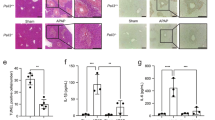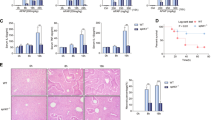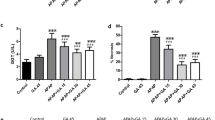Abstract
Acetaminophen (APAP)-induced liver injury is the main cause of acute liver failure. This study investigated the role of microsomal prostaglandin E synthase 2 (mPGES-2), discovered as one of the prostaglandin E2 (PGE2) synthases, in mediating APAP-induced liver injury. Using mPGES-2 wild-type (WT) and knockout (KO) mice, marked resistance to APAP-induced liver damage was found in mPGES-2 KO, as indicated by robust improvement of liver histology, changes in liver enzyme release, and marked decrease in APAP–cysteine adducts (APAP–CYS) and inflammatory markers. Moreover, the results confirmed that increase in liver PGE2 content in KO mice under basal conditions was not critical for the protection from APAP-induced liver injury. Importantly, mPGES-2 deletion inhibited the production of malondialdehyde (MDA), increasing glutathione (GSH) level. Enhanced GSH level may contribute to the inhibition of APAP toxicity in mPGES-2 KO mice. To further elucidate the role of mPGES-2 in the liver injury induced by APAP, adeno-associated viruses (AAV) were used to overexpress mPGES-2 in the liver. The results showed that mPGES-2 overexpression aggravates liver injury associated with an increase in inflammatory markers and chemokines after APAP treatment. Moreover, a lower level of GSH was detected in the mPGES-2 overexpression group compared to the control group. Collectively, our findings indicate that mPGES-2 plays a critical role in regulating APAP-induced liver injury, possibly by regulating GSH and APAP–CYS level, which may provide a potential therapeutic strategy for the prevention and treatment of APAP-induced liver injury.








Similar content being viewed by others
Abbreviations
- APAP:
-
Acetaminophen
- ALT:
-
Alanine aminotransferase
- AST:
-
Aspartate aminotransferase
- AAV:
-
Adeno-associated viruses
- APAP–CYS:
-
APAP–cysteine adducts
- CXCL:
-
C–X–C motif chemokine ligand
- CXCR:
-
C–X–C chemokine receptor
- COX:
-
Cyclooxygenase
- dmPGE2:
-
16,16-Dimethyl prostaglandin E2
- GSH:
-
Glutathione
- IL:
-
Interleukin
- KO:
-
Knockout
- mPGES-2:
-
Microsomal prostaglandin E synthase 2
- NAPQI:
-
N-acetylbenzoquinoneimine
- PGE2:
-
Prostaglandin E2
- TNF:
-
Tumor necrosis factor
- WT:
-
Wild type
- ATP:
-
Adenosine triphosphate
- HHT:
-
Hydroxyheptadecatrienoic acid
- MDA:
-
Malondialdehyde
- HE:
-
Hematoxylin–eosin
- MCP-1:
-
Monocyte chemoattractant protein-1
- NLRP3:
-
NLR family pyrin domain containing 3
References
Adams ML, Pierce RH, Vail ME et al (2001) Enhanced acetaminophen hepatotoxicity in transgenic mice overexpressing BCL-2. Mol Pharmacol 60(5):907–915
Bajt ML, Cover C, Lemasters JJ, Jaeschke H (2006) Nuclear translocation of endonuclease G and apoptosis-inducing factor during acetaminophen-induced liver cell injury. Toxicol Sci 94(1):217–225. https://doi.org/10.1093/toxsci/kfl077
Bhave VS, Donthamsetty S, Latendresse JR, Cunningham ML, Mehendale HM (2011) Secretory phospholipase A(2)-mediated progression of hepatotoxicity initiated by acetaminophen is exacerbated in the absence of hepatic COX-2. Toxicol Appl Pharmacol 251(3):173–180. https://doi.org/10.1016/j.taap.2011.01.013
Blazka ME, Wilmer JL, Holladay SD, Wilson RE, Luster MI (1995) Role of proinflammatory cytokines in acetaminophen hepatotoxicity. Toxicol Appl Pharmacol 133(1):43–52. https://doi.org/10.1006/taap.1995.1125
Cavar I, Kelava T, Vukojevic K, Saraga-Babic M, Culo F (2010) The role of prostaglandin E2 in acute acetaminophen hepatotoxicity in mice. Histol Histopathol 25(7):819–830. https://doi.org/10.14670/HH-25.819
Fan X, Wang L, Huang J, Lv H, Deng X, Ci X (2018) Pterostilbene reduces acetaminophen-induced liver injury by activating the Nrf2 antioxidative defense system via the AMPK/Akt/GSK3beta pathway. Cell Physiol Biochem 49(5):1943–1958. https://doi.org/10.1159/000493655
Frey SM, Wiegand TJ, Green JL et al (2015) Confirming the causative role of acetaminophen in indeterminate acute liver failure using acetaminophen-cysteine adducts. J Med Toxicol 11(2):218–222. https://doi.org/10.1007/s13181-015-0476-x
Greco A, Ajmone-Cat MA, Nicolini A, Sciulli MG, Minghetti L (2003) Paracetamol effectively reduces prostaglandin E2 synthesis in brain macrophages by inhibiting enzymatic activity of cyclooxygenase but not phospholipase and prostaglandin E synthase. J Neurosci Res 71(6):844–852. https://doi.org/10.1002/jnr.10543
Hansen K, Varvas K, Jarving I, Samel N (2014) Novel membrane-associated prostaglandin E synthase-2 from crustacean arthropods. Comp Biochem Physiol B: Biochem Mol Biol 174:45–52. https://doi.org/10.1016/j.cbpb.2014.05.004
He W, Cui L, Zhang C et al (2017) Sonic hedgehog promotes neurite outgrowth of cortical neurons under oxidative stress: involving of mitochondria and energy metabolism. Exp Cell Res 350(1):83–90. https://doi.org/10.1016/j.yexcr.2016.11.008
Jaeschke H, Bajt ML (2006) Intracellular signaling mechanisms of acetaminophen-induced liver cell death. Toxicol Sci 89(1):31–41. https://doi.org/10.1093/toxsci/kfi336
Jaeschke H, Knight TR, Bajt ML (2003) The role of oxidant stress and reactive nitrogen species in acetaminophen hepatotoxicity. Toxicol Lett 144(3):279–288
James LP, Kurten RC, Lamps LW, McCullough S, Hinson JA (2005) Tumour necrosis factor receptor 1 and hepatocyte regeneration in acetaminophen toxicity: a kinetic study of proliferating cell nuclear antigen and cytokine expression. Basic Clin Pharmacol Toxicol 97(1):8–14. https://doi.org/10.1111/j.1742-7843.2005.pto_02.x
Jania LA, Chandrasekharan S, Backlund MG et al (2009) Microsomal prostaglandin E synthase-2 is not essential for in vivo prostaglandin E2 biosynthesis. Prostaglandins Other Lipid Mediat 88(3–4):73–81. https://doi.org/10.1016/j.prostaglandins.2008.10.003
Jia Z, Wang N, Aoyagi T, Wang H, Liu H, Yang T (2011) Amelioration of cisplatin nephrotoxicity by genetic or pharmacologic blockade of prostaglandin synthesis. Kidney Int 79(1):77–88. https://doi.org/10.1038/ki.2010.331
Jollow DJ, Mitchell JR, Potter WZ, Davis DC, Gillette JR, Brodie BB (1973) Acetaminophen-induced hepatic necrosis. II. Role of covalent binding in vivo. J Pharmacol Exp Ther 187(1):195–202
Larson AM (2007) Acetaminophen hepatotoxicity. Clin Liver Dis 11(3):525–548. https://doi.org/10.1016/j.cld.2007.06.006
Li L, Huang W, Wang S et al (2018) Astragaloside IV attenuates acetaminophen-induced liver injuries in mice by activating the Nrf2 signaling pathway. Molecules (Basel, Switzerland). https://doi.org/10.3390/molecules23082032
Mancini JA, Blood K, Guay J et al (2001) Cloning, expression, and up-regulation of inducible rat prostaglandin e synthase during lipopolysaccharide-induced pyresis and adjuvant-induced arthritis. J Biol Chem 276(6):4469–4475. https://doi.org/10.1074/jbc.M006865200
Mitchell JR, Jollow DJ, Potter WZ, Davis DC, Gillette JR, Brodie BB (1973a) Acetaminophen-induced hepatic necrosis. I. Role of drug metabolism. J Pharmacol Exp Ther 187(1):185–194
Mitchell JR, Jollow DJ, Potter WZ, Gillette JR, Brodie BB (1973b) Acetaminophen-induced hepatic necrosis. IV. Protective role of glutathione. J Pharmacol Exp Ther 187(1):211–217
Murakami M, Naraba H, Tanioka T et al (2000) Regulation of prostaglandin E2 biosynthesis by inducible membrane-associated prostaglandin E2 synthase that acts in concert with cyclooxygenase-2. J Biol Chem 275(42):32783–32792. https://doi.org/10.1074/jbc.M003505200
Murakami M, Nakashima K, Kamei D et al (2003) Cellular prostaglandin E2 production by membrane-bound prostaglandin E synthase-2 via both cyclooxygenases-1 and -2. J Biol Chem 278(39):37937–37947. https://doi.org/10.1074/jbc.M305108200
Nguyen NU, Stamper BD (2017) Polyphenols reported to shift APAP-induced changes in MAPK signaling and toxicity outcomes. Chem Biol Interact 277:129–136. https://doi.org/10.1016/j.cbi.2017.09.007
North TE, Babu IR, Vedder LM et al (2010) PGE2-regulated wnt signaling and N-acetylcysteine are synergistically hepatoprotective in zebrafish acetaminophen injury. Proc Natl Acad Sci USA 107(40):17315–17320. https://doi.org/10.1073/pnas.1008209107
Qiu Y, Benet LZ, Burlingame AL (2001) Identification of hepatic protein targets of the reactive metabolites of the non-hepatotoxic regioisomer of acetaminophen, 3′-hydroxyacetanilide, in the mouse in vivo using two-dimensional gel electrophoresis and mass spectrometry. Adv Exp Med Biol 500:663–673
Reilly TP, Brady JN, Marchick MR et al (2001) A protective role for cyclooxygenase-2 in drug-induced liver injury in mice. Chem Res Toxicol 14(12):1620–1628
Sciskalska M, Sliwinska-Mosson M, Podawacz M, Sajewicz W, Milnerowicz H (2015) Mechanisms of interaction of the N-acetyl-p-aminophenol metabolites in terms of nephrotoxicity. Drug Chem Toxicol 38(2):121–125. https://doi.org/10.3109/01480545.2014.928722
Sciulli MG, Seta F, Tacconelli S et al (2003) Effects of acetaminophen on constitutive and inducible prostanoid biosynthesis in human blood cells. Br J Pharmacol 138(4):634–641. https://doi.org/10.1038/sj.bjp.0705078
Sun Y, Jia Z, Yang G et al (2014) mPGES-2 deletion remarkably enhances liver injury in streptozotocin-treated mice via induction of GLUT2. J Hepatol 61(6):1328–1336. https://doi.org/10.1016/j.jhep.2014.07.018
Takusagawa F (2013) Microsomal prostaglandin E synthase type 2 (mPGES2) is a glutathione-dependent heme protein, and dithiothreitol dissociates the bound heme to produce active prostaglandin E2 synthase in vitro. J Biol Chem 288(14):10166–10175. https://doi.org/10.1074/jbc.M112.418475
Tanikawa N, Ohmiya Y, Ohkubo H et al (2002) Identification and characterization of a novel type of membrane-associated prostaglandin E synthase. Biochem Biophys Res Commun 291(4):884–889. https://doi.org/10.1006/bbrc.2002.6531
Watanabe K, Kurihara K, Suzuki T (1999) Purification and characterization of membrane-bound prostaglandin E synthase from bovine heart. Biochem Biophys Acta 1439(3):406–414
Watanabe K, Ito S, Yamamoto S (2008) Studies on membrane-associated prostaglandin E synthase-2 with reference to production of 12L-hydroxy-5,8,10-heptadecatrienoic acid (HHT). Biochem Biophys Res Commun 367(4):782–786. https://doi.org/10.1016/j.bbrc.2008.01.029
Yamada T, Takusagawa F (2007) PGH2 degradation pathway catalyzed by GSH-heme complex bound microsomal prostaglandin E2 synthase type 2: the first example of a dual-function enzyme. Biochemistry 46(28):8414–8424. https://doi.org/10.1021/bi700605m
Yang G, Chen L, Zhang Y et al (2006) Expression of mouse membrane-associated prostaglandin E2 synthase-2 (mPGES-2) along the urogenital tract. Biochim Biophys Acta 1761(12):1459–1468. https://doi.org/10.1016/j.bbalip.2006.06.018
Yang B, Gao X, Ren Y, Wang Y, Zhang Q (2016) Oral paracetamol vs. oral ibuprofen in the treatment of symptomatic patent ductus arteriosus in premature infants: a randomized controlled trial. Experimental and therapeutic medicine 12(4):2531–2536. https://doi.org/10.3892/etm.2016.3676
Acknowledgements
This work was supported by the National Natural Science Foundation of China (Grant no. 81603179), the China Postdoctoral Science Foundation (Grant no. 2016M601893), the China Postdoctoral Science Special Foundation (Grant no. 2018T110555), Top-notch Academic Programs Project of Jiangsu Higher Education Institutions (PPZY2015B161) and Innovative Entrepreneurship Training Program for National College Students (Grant no. 201710313022).
Author information
Authors and Affiliations
Contributions
Y Sun and XX Yin conducted the study concept and design. H Wang, RM Zhang, and YY Zhu contributed to data acquisition, data analysis, and drafting of the manuscript. T Teng, YJ Cheng, A Chowdhury, JH Lu, ZJ Jia, and J Song participated critically in the discussion and revision of the manuscript.
Corresponding authors
Ethics declarations
Conflict of interest
The authors declare that they have no conflicts of interest.
Ethical standards
All procedures in this study were carried out in strict accordance with the recommendations of the Guide for the Care and Use of Laboratory Animals of China Association for Laboratory Animal Science and approved by the Animal Ethics Committee of Xuzhou Medical University.
Additional information
Publisher's Note
Springer Nature remains neutral with regard to jurisdictional claims in published maps and institutional affiliations.
Rights and permissions
About this article
Cite this article
Wang, H., Zhang, R., Zhu, Y. et al. Microsomal prostaglandin E synthase 2 deficiency is resistant to acetaminophen-induced liver injury. Arch Toxicol 93, 2863–2878 (2019). https://doi.org/10.1007/s00204-019-02543-1
Received:
Accepted:
Published:
Issue Date:
DOI: https://doi.org/10.1007/s00204-019-02543-1




